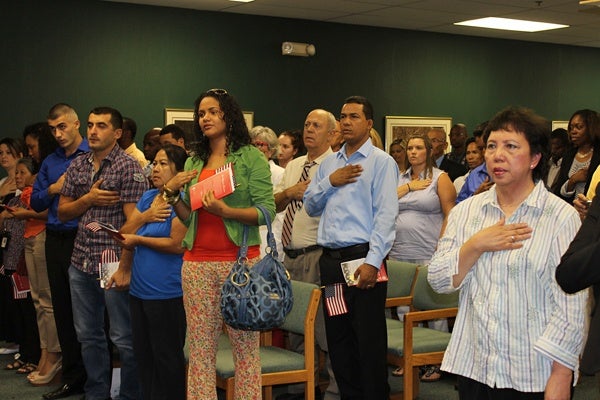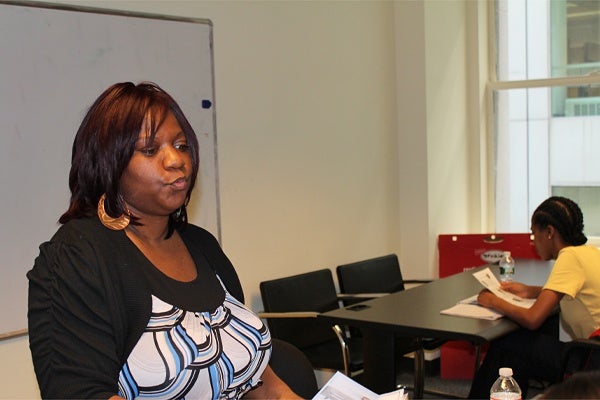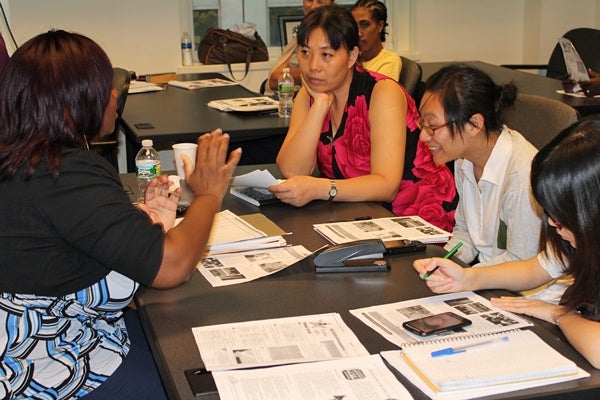After naturalization, a focus on educating brand-new voters
As the presidential campaign intensifies, a large group of new citizens is quietly increasing the ranks of registered voters.
Ten minutes after posing for a photo with her freshly signed naturalization certificate, Denise Ciel Batiste was a registered Pennsylvania voter. She registered in the very same room where she took her Oath of Allegiance, at a table volunteers had set up to help new citizens sign up.
“J’aime ma democracie. I love my democracy,” said Bastite, a Haitian woman who had been in Philadelphia for about a decade.
The 70-some people sworn in that afternoon had waited between five to 20 years for the opportunity. In a welcoming speech they were encouraged by supervising immigration officer Steven Weiler to exercise their new rights.
“You will still be yourselves, of course, but with citizenship comes new freedoms and rights and new responsibilities,” said Weiler. “You can obviously register to vote. You can support public officials.”
Great expectations
The atmosphere in the room is a mix of excitement and a sense achievement. Yet there’s still a bit of apprehension that comes from having conquered all the hurdles in the long, complicated process of naturalization.
Family members are at the ready with cameras and iPads to celebrate the moment. Some immigration lawyers sit on the sides of the room, satisfied. Still many are not too comfortable about being taped or photographed for media.
There are about five such ceremonies a week at the Immigration and Naturalization Center at 16th and Callowhill streets. Last year, nearly 17,000 immigrants took the oath in our region.
“We got, I think, 36. And we had 30-something from this morning. So it’s about 70 per day,” said Mariel Mussak, one of the volunteer workers registering voters.
The Pennsylvania Immigration and Citizen’s Coalition, which runs the registration table, has enrolled 18,000 new citizens to vote since 2008, according to board member Nadia Hewka.
“By the time that they’re becoming citizens and have gone through the civics classes, the history, the language,” said Hewka, “they come to a really deep understanding of what it means to be a U.S. citizen and what it means to be a good citizen. So by the time we come into contact with folks they’re ready, and they’re excited to become citizens and to vote.”
The long process towards citizenship often starts with an English class. Instructor Kisha Carter teaches an English course at the Welcoming Center for New Pennsylvanians, with vocabulary lessons focusing on civics. Her students are recent immigrants from Russia, Ethiopia, Vietnam, Nigeria, Syria and China.
Educating new voters
Immigrants have to wait at least five years to be eligible for naturalization. But as with many other American citizens, registering to vote doesn’t always translate into voting on election days.
That worries Hewka.
“The statistics are that naturalized immigrants who are now citizens are registered to vote at a lower rate,” Hewka said. “And immigrants in general, immigrant communities in general, tend to turn out to vote at lower rates. So we’re looking to expand this program actually and to try to reach people that are not just brand-new citizens, but also people who have been naturalized in years past and who haven’t voted or who haven’t registered.”
Young Nigerian-American entrepreneur Uche Oje and a group of civic engagement activists recently formed the African-Caribbean Political Action Committee to get immigrants voting. Oje said the PAC will also try to lobby and convince elected leaders to take up issues that matter to new citizens.
“It’s not just about voting. It’s about taking advantage of the representation that you have from your politicians, elected officials who are put there to serve you. Certainly politicians should be driven by a higher ideal and feel the need to serve everybody,” said Oje.
But Oje adds it’s hard to get politicians interested in these issues if they are unsure new citizens will truly turn out in big numbers.
That won’t be an issue for a new registered voter from Guyana who did not want his name published. At the naturalization ceremony he said he couldn’t wait to exercise his new civic power.
“It’s important for me for many reasons,” he said. “It’s about travel. And since I’m here, I want to be part of everything first. I want to vote. That’s the number-one reason.”
WHYY is your source for fact-based, in-depth journalism and information. As a nonprofit organization, we rely on financial support from readers like you. Please give today.







